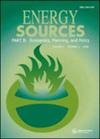Peer-to-peer electricity trading and the sharing economy: social, markets and regulatory perspectives
IF 2.2
4区 工程技术
Q3 ENERGY & FUELS
Energy Sources Part B-Economics Planning and Policy
Pub Date : 2022-03-20
DOI:10.1080/15567249.2022.2050849
引用次数: 10
Abstract
ABSTRACT Peer-to-peer (P2P) electricity trading is a new data-driven business model currently being trialed within the energy sector. Introducing P2P transactions to an essential service such as energy supply could have far-reaching implications for individuals and the grid. This paper raises considerations and questions from social, market design and regulatory points of view, which should be understood and addressed by societies and policymakers. It does this by considering under what circumstances it is reasonable to conceptualize P2P electricity trading as part of the sharing economy, and drawing parallels to the sharing economy experience in other sectors. In order to reap the full societal benefits, while avoiding considerable risks to infrastructure and individuals, a policy approach promoting dialogue and innovation is necessary. We suggest the regulatory sandbox is the most appropriate tool to achieve this and would help avoid the breakdown of trust between policymakers and platform companies observed in other sectors.点对点电力交易和共享经济:社会、市场和监管视角
点对点(P2P)电力交易是一种新的数据驱动的商业模式,目前正在能源部门试用。将P2P交易引入能源供应等基本服务可能对个人和电网产生深远影响。本文从社会、市场设计和监管的角度提出了一些思考和问题,这些问题应该被社会和决策者理解和解决。它通过考虑在什么情况下将P2P电力交易作为共享经济的一部分是合理的概念,并将其与其他部门的共享经济经验进行比较来实现这一目标。为了获得充分的社会效益,同时避免对基础设施和个人造成相当大的风险,必须采取一种促进对话和创新的政策方法。我们认为监管沙箱是实现这一目标的最合适的工具,它将有助于避免在其他行业观察到的政策制定者和平台公司之间信任的破裂。
本文章由计算机程序翻译,如有差异,请以英文原文为准。
求助全文
约1分钟内获得全文
求助全文
来源期刊

Energy Sources Part B-Economics Planning and Policy
ENERGY & FUELS-
CiteScore
6.80
自引率
12.80%
发文量
42
审稿时长
6-12 weeks
期刊介绍:
12 issues per year
Abstracted and/or indexed in: Applied Science & Technology Index; API Abstracts/Literature; Automatic Subject Index Citation; BIOSIS Previews; Cabell’s Directory of Publishing Opportunities in Economics and Finance; Chemical Abstracts; CSA Aquatic Science & Fisheries Abstracts; CSA Environmental Sciences & Pollution Management Database; CSA Pollution Abstracts; Current Contents/Engineering, Technology & Applied Sciences; Directory of Industry Data Sources; Economic Abstracts; Electrical and Electronics Abstracts; Energy Information Abstracts; Energy Research Abstracts; Engineering Index Monthly; Environmental Abstracts; Environmental Periodicals Bibliography (EPB); International Abstracts in Operations Research; Operations/Research/Management Science Abstracts; Petroleum Abstracts; Physikalische Berichte; and Science Citation Index.
Taylor & Francis make every effort to ensure the accuracy of all the information (the "Content") contained in our publications. However, Taylor & Francis, our agents, and our licensors make no representations or warranties whatsoever as to the accuracy, completeness, or suitability for any purpose of the Content. Any opinions and views expressed in this publication are the opinions and views of the authors, and are not the views of or endorsed by Taylor & Francis. The accuracy of the Content should not be relied upon and should be independently verified with primary sources of information. Taylor & Francis shall not be liable for any losses, actions, claims, proceedings, demands, costs, expenses, damages, and other liabilities whatsoever or howsoever caused arising directly or indirectly in connection with, in relation to, or arising out of the use of the Content. Terms & Conditions of access and use can be found at http://www.tandfonline.com/page/terms-and-conditions .
 求助内容:
求助内容: 应助结果提醒方式:
应助结果提醒方式:


